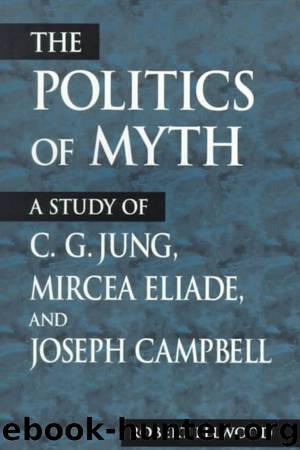The Politics of Myth: A Study of C. G. Jung, Mircea Eliade, and Joseph Campbell by Robert Ellwood

Author:Robert Ellwood [Ellwood, Robert]
Language: eng
Format: epub
Tags: Religion, Psychology of Religion, Mythology, Politics, Non-Fiction
ISBN: 9780791443057
Google: 8txlpRyqtUIC
Amazon: 0791443051
Goodreads: 8125785
Publisher: SUNY Press
Published: 1999-09-01T23:00:00+00:00
One can only regret that the mature Eliade never found the time or the courage to address open and fully those errors of his youth, subjecting them to the acute analysis of spiritual consciousness of which he was capable in examining the initiatory ordeals of others. It seems more than likely that he was one of those intellectuals so innocent and naive, and so entranced by the pull of a spiritual drama that raised one above the pale cast of thought, that he as youthful "mythologist" saw the myths he wanted to see enacted by the Legion, and blinded himself to its ugly side. Throughout the twentieth century the likes of the young Eliade have embraced fascism and Marxism, feeling only the same righteousness and joy. Quite nonviolent by nature himself, fundamentally more aesthetic than political (or, for that matter, than scholarly in the most rigorous sense of the term), he exalted the Legion's own martyrs but, incredibly given its martial tone and its propaganda, was surprised by its kills.
Had he talked about all this as the light of common day overtook his fantasies after 1945, he would have raised his own stature in the end, and we would have known more about the mid-twentieth century, that era of unprecedented opulence and terror, of myth and science, through which he made his pilgrimage. Culianu, after mentioning Eliade's reference in the autobiography to his taking a "dangerous turn," at that point in his life, adds, "How much we wish he had said: a wrong one!" 46 But he did not.
The apocalyptic year 1945 was a time of radical disjuncture in Eliade's pilgrimage, a season of moving from one life to another. The late thirties and early forties had been a time of death in his personal world, as they had been for so many millions in the world at large. Codreanu was executed in 1938, Nae Ionescu died prematurely of a heart attack in 1940, Sebastian was hit by a truck and killed in 1945, Eliade's first wife Nina died of cancer in 1944.
After 1945 death changed to new life. He met his second wife, Christinel, in Paris where they were both postwar exiles from Romania. For Eliade was in exile in a strange new postwar world, a world shaped by atomic bombs, the revelations of Auschwitz, communist triumph in eastern Europe, elsewhere the victory of British and U.S. values. In such a world the less said about the past the better, of course. But it must quite honestly have also seemed to Eliade that 1945 afforded an opportunity such as is rarely given a human being to reconsruct himself thoroughly and begin anew, despite the possibility that a few ghostly "mal-entendus" would still waft out of the now-remote past. During the final months of the war, still in Lisbon, he sensed a profound change overtaking him. He suffered severe insomnia:
But I did not resort to sleeping pills. Insead, I reread and meditated on the Gospels, trying to discover the direction to take to get out of the labyrinth.
Download
This site does not store any files on its server. We only index and link to content provided by other sites. Please contact the content providers to delete copyright contents if any and email us, we'll remove relevant links or contents immediately.
The Secret History by Donna Tartt(19053)
The Social Justice Warrior Handbook by Lisa De Pasquale(12187)
Thirteen Reasons Why by Jay Asher(8893)
This Is How You Lose Her by Junot Diaz(6877)
Weapons of Math Destruction by Cathy O'Neil(6265)
Zero to One by Peter Thiel(5787)
Beartown by Fredrik Backman(5737)
The Myth of the Strong Leader by Archie Brown(5500)
The Fire Next Time by James Baldwin(5431)
How Democracies Die by Steven Levitsky & Daniel Ziblatt(5215)
Promise Me, Dad by Joe Biden(5141)
Stone's Rules by Roger Stone(5081)
A Higher Loyalty: Truth, Lies, and Leadership by James Comey(4954)
100 Deadly Skills by Clint Emerson(4921)
Rise and Kill First by Ronen Bergman(4780)
Secrecy World by Jake Bernstein(4741)
The David Icke Guide to the Global Conspiracy (and how to end it) by David Icke(4709)
The Farm by Tom Rob Smith(4502)
The Doomsday Machine by Daniel Ellsberg(4484)
